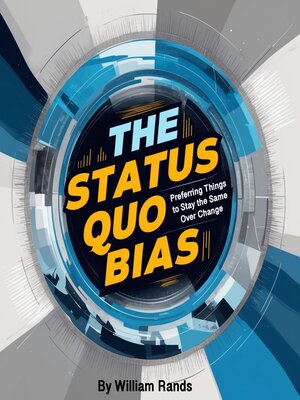The Status Quo Bias
audiobook (Unabridged) ∣ Preferring Things to Stay the Same over Change
By William Rands

Sign up to save your library
With an OverDrive account, you can save your favorite libraries for at-a-glance information about availability. Find out more about OverDrive accounts.
Find this title in Libby, the library reading app by OverDrive.



Search for a digital library with this title
Title found at these libraries:
| Library Name | Distance |
|---|---|
| Loading... |
The Status Quo Bias is a psychological phenomenon in which individuals have a preference for the current state of affairs, often resisting change even when the alternatives might be more beneficial. This bias manifests in various aspects of life, from personal decisions to larger social, political, and economic systems. People tend to prefer things staying the same because it feels safer and more familiar, even if change could lead to improved outcomes. It is a powerful force that influences how we make choices, how we interact with others, and even how societies evolve over time.
At its core, the Status Quo Bias can be seen as a form of cognitive inertia—our minds prefer to stick with what we know, as a way of minimizing discomfort and uncertainty. This preference for the familiar is deeply rooted in our psychological and evolutionary makeup. Throughout history, stability was often synonymous with survival. In ancient environments, maintaining the status quo, or sticking to known behaviors and environments, increased the chances of safety and survival. However, in the modern world, where innovation and change are often necessary for progress, this bias can become a hindrance to growth and adaptation.
The effects of Status Quo Bias can be seen across many facets of life. In personal decision-making, individuals may resist making changes to their routines, relationships, or careers, even when they recognize that change could improve their situation. In the workplace, organizations may be slow to implement new technologies or adopt innovative strategies due to a preference for maintaining established systems and practices. On a societal level, political and social systems are often resistant to change, with entrenched interests and historical norms reinforcing the status quo.







